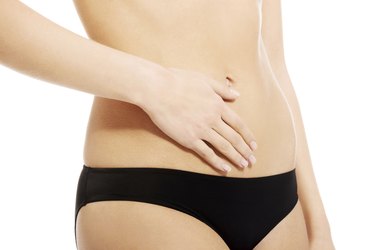
If you're trying to get pregnant, you'll likely want to make sure you're not doing anything that could negatively impact your fertility or harm your embryo if you conceive. "Fat burners" are a broad category of substances that occur in foods or that you take as supplements. Not only is there no evidence that they are effective as a diet strategy, they could impact your fertility.
Fertility
Video of the Day
Getting pregnant requires such a complex and carefully timed chain of events to occur that it can seem a wonder people manage to conceive at all. To conceive, you have to have intercourse during a narrow window of time, such that there are live sperm in your reproductive tract during the approximately 24-hour life span of an ovulated egg. The fertilized egg then has to travel safely to -- and implant in -- the uterus, after which it begins a process of cellular division that is also fraught with potential complication. Despite this, 85 percent of healthy young couples conceive within the first year of trying, explain Heidi Murkoff and Sharon Mazel in their book "What To Expect When You're Expecting."
Video of the Day
"Fat Burners"
There are many different substances colloquially called "fat burners." Some are single compounds, like caffeine, that have the ability to increase your metabolic rate. Others are proprietary herbal blends that manufacturers claim will help you lose fat. One thing they all have in common is that there is no scientific evidence to support the notion that any substance or mixture truly causes you to burn fat, nor that "fat burners" have a role in helping to promote or maintain long-term weight loss.
Caffeine
Among the most common ingredients in supplements that claim to burn fat is caffeine, which stimulates the "fight or flight" nervous system. Because of this stimulation, caffeine increases your heart rate and respiration rate and changes blood flow patterns. It also decreases your fertility and increases your chances of having a miscarriage during early pregnancy if you use it in heavy doses. In their book "You: Having a Baby," Drs. Michael Roizen and Mehmet Oz recommend no more than a few hundred milligrams of caffeine a day if you're trying to conceive or are pregnant.
Herbal Supplements
Many herbal "fat burners" are on the market, but none of them have been tested safe and effective for use in pregnancy. Some, like ma huang, have been proven unsafe and banned from inclusion in supplements in the United States. Others simply have unproven safety records. Per the Dietary Supplement Health and Education Act of 1994, the FDA doesn't require that manufacturers prove an herb is safe or effective before marketing it. Talk to your doctor before using any herbal supplement if you're trying to conceive or if you're pregnant.